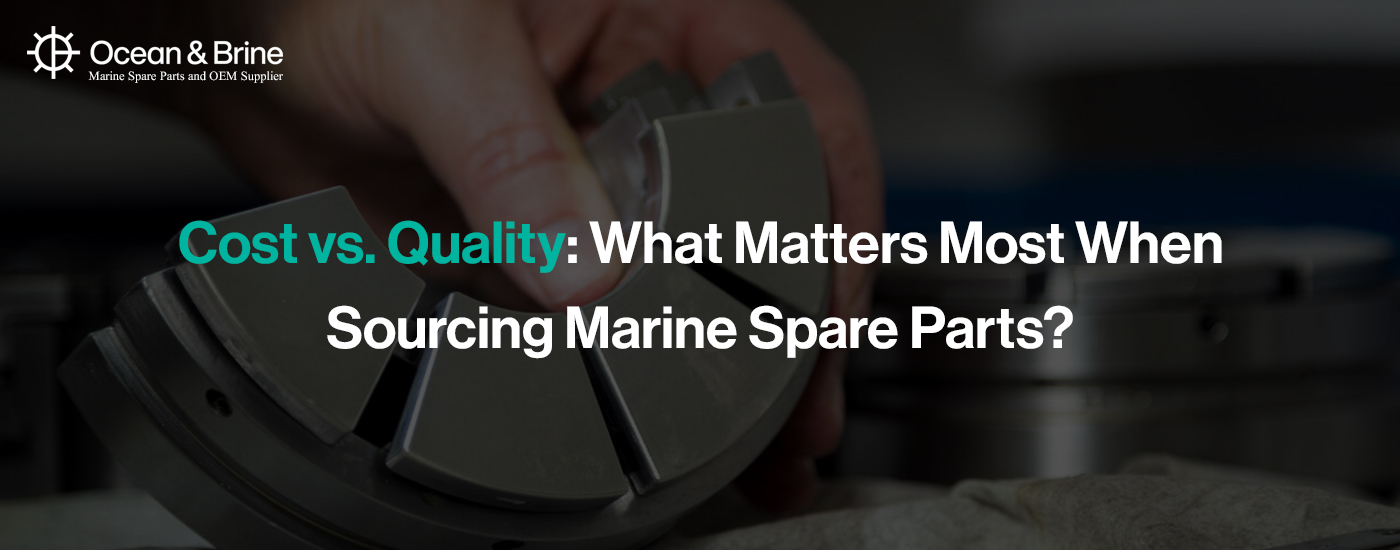When sourcing marine spare parts, both cost and quality are critical factors. Still the relative importance of each depends on the context—such as the operational requirements, the type of vessel, the regulatory environment, and the nature of the spare part itself. We have attempted to walk you through key considerations in deciding whether cost or quality is important to you.
We will first look at the factors that impact your decision for quality or low cost of marine spare parts.
Cost is a critical factor when sourcing marine equipment for several important reasons. Here are some:
- Shipping companies operate on low margins. Controlling costs for spare parts is essential to remain profitable and competitive.
- Predictable expenses help in accurate budgeting and financial planning.
- What matters is not just the price of the part but the overall cost, including shipping, customs, storage, installation, and downtime.
- Cheaper spares may lead to frequent failures, raising the total cost of ownership (TCO).
- Choosing cost-effective spares helps minimize downtime. High-cost or delayed parts can result in vessels being out of service, which is extremely expensive.
- Cost-efficient sourcing helps maintain adequate inventory levels without overstocking.
- Marine spares often need to be sourced globally, where logistics costs (e.g., air freight for urgent parts) can be high.
- While cost is important, so is quality and compliance (e.g., IMO regulations, class approvals). Poor-quality cheap spares can lead to failure, fines, safety issues, and compliance irregularities.
- Cost-effective does not mean the cheapest—it means the best value for performance and compliance.
- Competitive pricing helps establish long-term contracts and framework agreements, which can bring volume discounts, priority service, and better payment terms.
Cost is essential not just as a number but as part of a broader strategy that balances price, quality, delivery time, and overall impact on vessel performance and safety.
Quality marine spares should never be compromised for critical systems, where safety, compliance, and reliability are paramount. However, cost-conscious decisions can be made intelligently for less critical components by assessing risk and sourcing from trusted alternative suppliers.
Let us now work out the various factors that impact choosing the quality marine spare parts and the need to source them:
- Marine vessels operate under strict safety regulations (IMO, SOLAS, class societies like DNV, ABS, Lloyd’s) to follow the safety and compliance set by the regulatory bodies.
- Poor-quality spares can lead to equipment failure, putting crew safety, cargo, and the vessel at risk.
- Non-compliant parts can result in detentions during port inspections, heavy fines, or even vessel bans.
- High-quality spares ensure the unfailing performance of critical systems like propulsion, navigation, and safety equipment.
- Equipment failures caused at sea by non-compliant spares can cause costly delays, towing expenses, or even accidents.
- Buy quality marine spare parts to reduce unscheduled maintenance and improve overall fleet availability.
- Quality parts typically have a longer service life, reducing the frequency of replacements.
- This lowers the total cost of ownership (TCO), even if the upfront cost is higher than inferior alternatives.
- Genuine, high-quality parts are designed to match OEM marine parts specifications, ensuring optimal fit and function.
- Poor-quality or counterfeit parts can cause mismatches or damage connected systems, worsening the problem.
- Charterers and clients prefer vessels with a proven maintenance and safety track record.
- Low-quality spares often have hidden risks: premature failure, warranty issues, higher fuel consumption due to inefficiency, and increased insurance premiums.
- Investing in quality reduces risk exposure and the likelihood of catastrophic system failures.
Cost vs quality is a perennial moot point often people raising voices and concerns about both. So how should you overcome this dilemma?
Here are some factors that you can consider to choose between the cost or quality of the marine spares that you need:
- For high-criticality parts like engine components, safety systems, and navigation electronics, prioritizing quality and OEM compliance gives you an edge in safety.
- Marine environments are harsh. Low-quality parts can fail under pressure, posing safety risks to crew, cargo, and vessels. Hence, quality should be the priority.
- Many marine parts must meet IMO, SOLAS, or class society standards. Subpar parts may not be certified, and hence quality should come first.
- Regulatory compliance in quality parts enhances the safety net by reducing failed component issues.
- High-quality parts often last longer and require less frequent replacement, leading to a better total cost of ownership.
- However, budget constraints—especially for older vessels—force owners to prioritize cost over quality to remain operational.
- For components that do not affect safety or performance, like cosmetic fittings and non-structural items, lower-cost alternatives might be acceptable.
- When sourcing marine spares, consumables, or frequently replaced items, cost efficiency through trusted but affordable brands can often be prioritized as this is a bulk purchase.
- Marine spare parts procurement from low-cost regions or authorized aftermarket producers can yield cost savings without compromising quality.
A few tips for sourcing marine spare parts efficiently by deciding between cost and marine spare parts quality
- Choose vendors with a proven track record and certifications.
- Always request material certificates, test reports, and OEM credentials.
- Evaluate not just the upfront price but also maintenance, replacement intervals, and failure risk.
- For critical systems, use OEM or Class-approved parts. For non-critical components, consider approved third-party alternatives.
- A good warranty can signal confidence in product quality and reduce risk.
Quality should never be compromised for critical systems, where safety, compliance, and reliability are paramount. However, cost-conscious decisions can be made intelligently for less critical components by assessing risk and sourcing from trusted alternative marine spare parts suppliers.
For most marine operators, the real challenge is not choosing between cost or quality—but finding the optimal trade-off based on application and risk tolerance.
